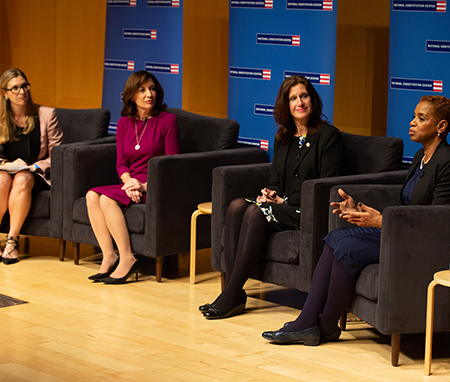Described in The Federalist as “the celebrated Montesquieu,” Charles de Montesquieu was cited more often than any other author from 1760-1800. In what ways did his writings and ideas help shape the U.S. Constitution and the structure of American government? Join William B. Allen of Michigan State University, Thomas Pangle of the University of Texas at Austin, Dennis Rasmussen of Syracuse University, and Diana Schaub of the American Enterprise Institute, for a discussion on the political thought of Montesquieu and his influence on American democracy. Jeffrey Rosen, president and CEO of the National Constitution Center, moderates.
Video
Podcast
Participants
William B. Allen is emeritus dean and emeritus professor of political philosophy in the department of political science at Michigan State University. He has published extensively and serves as editor and translator of a forthcoming edition of Montesquieu’s The Spirt of the Laws.
Thomas Pangle is the co-director of The Thomas Jefferson Center for the Study of Core Texts and Ideas and holds the Joe R. Long Chair in Democratic Studies at the University of Texas at Austin. He is author of Montesquieu's Philosophy of Liberalism, The Theological Basis of Liberal Modernity in Montesquieu's “Spirit of the Laws," among others, and his newest book is The Life of Wisdom in Rousseau's "Reveries of the Solitary Walker."
Dennis Rasmussen is a professor of political science at Syracuse University. He is the author of five books, including The Pragmatic Enlightenment: Recovering the Liberalism of Hume, Smith, Montesquieu, and Voltaire, and most recently, The Constitution’s Penman: Gouverneur Morris and the Creation of America’s Basic Charter.
Diana Schaub is a professor of political science at Loyola University Maryland and nonresident senior fellow at the American Enterprise Institute. An expert on American political thought, she is the author of three books, including Erotic Liberalism: Women and Revolution in Montesquieu’s “Persian Letters," and her newest book is His Greatest Speeches: How Lincoln Moved the Nation.
Jeffrey Rosen is the president and CEO of the National Constitution Center, a nonpartisan nonprofit organization devoted to educating the public about the U.S. Constitution. Rosen is also professor of law at The George Washington University Law School and a contributing editor of The Atlantic.
Additional Resources
- Dennis Rasmussen, Fears of a Setting Sun: The Disillusionment of America's Founders
- Diana Schaub, Erotic Liberalism: Women and Revolution in Montesquieu’s Persian Letters
- The Federalist Papers
- Dennis Rasmussen, The Pragmatic Enlightenment: Recovering the Liberalism of Hume, Smith, Montesquieu, and Voltaire
- Thomas Pangle, Montesquieu’s Philosophy of Liberalism: A Commentary on the Spirit of the Laws
- Thomas Pangle, The Theological Basis of Liberal Modernity in Montesquieu’s Spirit of the Laws
- Montesquieu, The Spirit of the Laws: A Critical Edition, ed. William B. Allen
- Montesquieu, The Spirit of the Laws (1748)
- Thomas Pangle, “Considerations on the Romans,” in The Cambridge Companion to Montesquieu
- Diana Schaub, “Montesquieu on the Liberty of Women," in The Cambridge Companion to Montesquieu
- Montesquieu, The Persian Letters (1721)
Full Transcript
View Transcript
This transcript may not be in its final form, accuracy may vary, and it may be updated or revised in the future.
Stay Connected and Learn More
Continue the conversation on Facebook and Twitter using @ConstitutionCtr.
Sign up to receive Constitution Weekly, our email roundup of constitutional news and debate, at bit.ly/constitutionweekly.
Please subscribe to Live at the National Constitution Center and our companion podcast We the People on Apple Podcasts, Stitcher, or your favorite podcast app.








